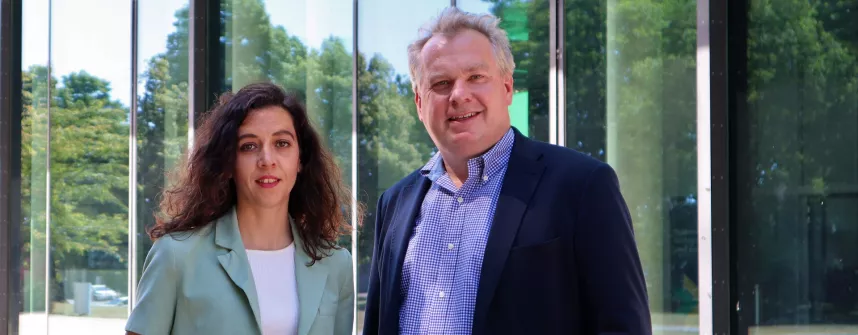Constructor University researchers discover new class of membrane carriers
Only one year after introducing a new concept to membrane carriers, Werner Nau, Professor of Chemistry, and fellow researchers from Constructor University in Bremen, Universidade de Santiago de Compostela and the Czech Academy of Sciences celebrate yet another breakthrough in chemical cell biology. The results have been published in the prestigious Journal of the American Chemical Society in June 2023.
Efficient transport of peptides into the cell interior is emerging as a key technology in modern medicine. However, the membrane acts as a selective barrier that hinders the passage of hydrophilic molecules such as peptides and other interesting bioactive compounds. Different synthetic vehicles for those cargos are constantly being sought to complex and protect peptides throughout their journey, preventing their degradation and achieving their efficient release at the desired location.
Researchers from Constructor University in Bremen, in collaboration with researchers at the Universidade de Santiago de Compostela (Spain) and the Czech Academy of Sciences have now reported a new class of membrane carriers in the Journal of the American Chemical Society (JACS). Known as cobalt bisdicarbollides or COSANs (“CObalt SANdwich complexes”), the new carriers behave as efficient and selective molecular transporters for water-soluble cationic peptides, both in artificial membrane models and living cells. "We present their use as transporters of peptides, which would otherwise be impermeable, across artificial and cellular membranes without causing membrane leakage," says Andrea Barba-Bon, postdoctoral researcher at Constructor University, "Although they have already been employed in many different fields related to biology and medicine, this is the first time COSAN sandwich clusters have been confirmed to act as selective membrane transporters for cationic peptide cargos."
The new carriers owe their membrane carrier activity due to their so-called “superchaotropic” property, which means that the clusters are both highly hydrophilic (water-soluble), but at the same time also highly lipophilic, that is, soluble in lipids and also lipid membranes. “When dissolving in the membranes, they can carry other molecules such as peptide drugs with them” said Nau, whose team collaborated with the group of Klaudia Brix, Professor of Cell Biology, and that of Mathias Winterhalter, Professor of Biophysics at Constructor University.
In presenting this new discovery, the German-Spanish team is following up on their new concept to membrane carriers introduced only one year back. The new family of boron clusters, now introduced in JACS, opens new research directions and reinforces the international interdisciplinary collaboration. The new cluster carriers excel in regard to their high activity and have additional advantages compared to previously known membrane carriers. "Compared to other clusters, COSANs appear to be more selective, primarily transporting cationic peptides" highlighted Javier Montenegro from the Universidade de Santiago de Compostela. These new boron-based compounds could have a future impact in the field of drug delivery, offering a new strategy to overcome membrane natural barriers and improve the effectiveness of peptide-based therapies.
Link to Article:
https://doi.org/10.1021/jacs.3c01623
Questions answered by:
Dr. Werner Nau | Professor of Chemistry
wnau@constructor.university | Tel.: +49 421 200-3233
About Constructor University:
An international community, vibrant and diverse. Offering academic excellence, ensuring the highest standards in research and teaching. Empowering students to solve the world's pressing challenges through knowledge and science: Constructor University is a top-ranked, English-speaking, private university. Founded in 2001, it provides a wide range of 25+ academic programs and PhD. The Constructor ecosystem comprises the University, located in Bremen, Germany, and an institute in Schaffhausen, Switzerland.
Over 1.800 students from more than 110 nations on campus benefit from a unique interdisciplinary, foundational theoretical and practical education. Enriched with a buzzing entrepreneurial culture that prepares young professionals to thrive in the job market. With 6.000+ alumni worldwide, our community keeps growing – with our highest cohort ever registered in 2022.
The research-centric faculty projects are funded by the German Research Foundation and the European Union's Framework Program for Research and Innovation as well as by globally leading companies.
The Constructor ecosystem benefits from partnerships with high-ranked universities such as Carnegie Mellon, the University of Geneva or the National University of Singapore School of Computing, and technology companies such as Anisoprint, JetBrains and ChemDiv.
Constructor is a global institution dedicated to addressing the main challenges of the world through science, education, and technology. Apart from the University in Bremen, the ecosystem comprises an Institute in Schaffhausen (Switzerland) and several for-profit entities that provide technology infrastructures and solutions, life-long education programs, consulting services, and funding.
